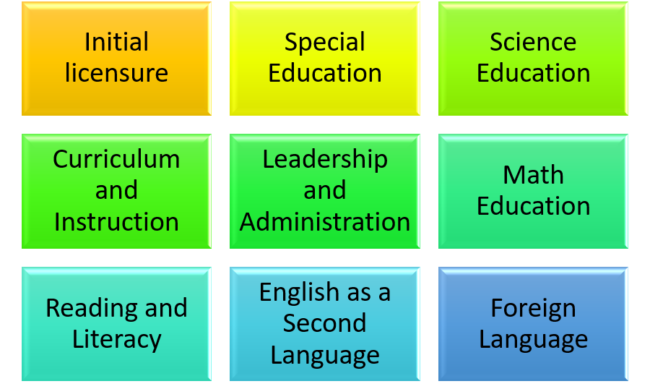Not all master’s degree programs in elementary education cover the same curriculum. There are many different concentrations you could choose to pursue under the umbrella of elementary education. The different types of elementary education master’s degree programs include initial certification programs for new teachers, programs that equip established teachers with the skills to teach in special education classrooms, programs with an emphasis on one particular content area and programs that prepare you for non-teaching roles.
Initial Licensure Elementary Education Programs
If you’re looking to shift careers to a role as elementary school teacher, then you want to be sure that you are choosing a program that prepares you for initial teaching certification or licensure. You might expect that any advanced degree in education would satisfy teaching licensure requirements, but that’s not the case. Certain state-specific requirements must be met to attain a teaching certification. For those who didn’t complete those requirements as an undergraduate because they chose a different major besides education, a Master of Arts in Teaching program that meets these requirements may be the best option for getting certified.
Initial licensure programs in elementary education may be graduate-level work, but they touch on many of the same general foundations that you would have covered in a bachelor’s degree program. They include coursework that will help you learn to teach effectively, including managing the classroom, creating valuable and engaging lesson plans and handling academic assessments and evaluations.
If you’re new to teaching, your graduate education may take longer to complete. Some non-licensure Master of Education programs can be completed in just one year, but Master of Arts in Teaching programs often take two years, according to U.S. News & World Report.
IMAGE SOURCE: Pixabay, public domain
Special Education for Elementary School Students
Another type of master’s degree you could earn in elementary education is special education. Degree programs that focus on the theory and skills for teaching and learning of elementary school students with special needs may be intended to help you attain a separate state credential or purely for your own professional development. Often, they include studies in diversity and inclusion in the classroom as well as the foundations of teaching and learning among children with disabilities. You might complete coursework relating to teaching strategies for students with certain kinds of developmental, behavioral or learning disabilities, such as autism spectrum disorder.
Some elementary education programs offer concentrations in teaching a different population of students – those who are academically or intellectually gifted. Although their needs often are very different, advanced learners, too, have unique needs.
Content Areas in Elementary Education Graduate Studies
In many elementary schools, teachers of lower grade levels are responsible for teaching all major subjects of study, as opposed to a single content area, as is common in high schools. This doesn’t mean that you can’t, or shouldn’t, specialize your graduate studies in a content area that interests you. In fact, many schools are experiencing a shortage of qualified teachers of science, mathematics and foreign language or ESL. A master’s degree in elementary math or science can help you become more highly qualified to teach these subjects and more appealing to school districts that are struggling to find effective math and science teachers. Another consistently popular content area is reading and literacy, particularly because kindergarten and elementary school grade levels are where students learn the fundamentals of phonics, reading, writing and reading comprehension.
A master’s degree in elementary education ESL is another great option if you are a proficient speaker of Spanish or another foreign language that is prevalent in your area.
Elementary Education Degrees Beyond Teaching
In addition to the numerous master’s in elementary education programs that focus on teaching and learning in the classroom, there are degree options intended for jobs outside the classroom, too. For example, if you want to be your elementary school’s instructional coordinator or curriculum specialist – the person responsible for developing curricula and materials used for teaching in the classroom – you might enroll in a Master of Education in Curriculum and Instruction program with a concentration in elementary education or children’s literature.
You can also use a specialized master’s in education degree program to prepare for a job as an elementary school counselor or elementary school principal, although many school counseling and educational administration and leadership programs include studies relevant to the job role in grades from preschool or kindergarten to the twelfth grade.
Additional Resources
What Do You Study in a Master’s Program for Elementary Education?
What Is a Master of Arts in Teaching Degree?


